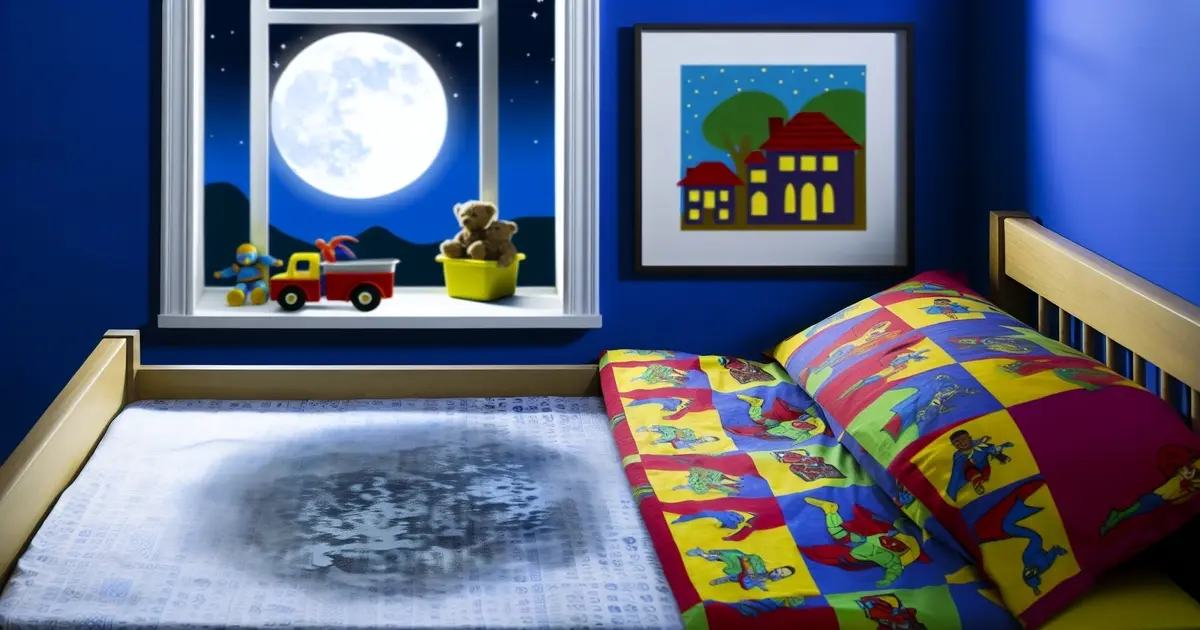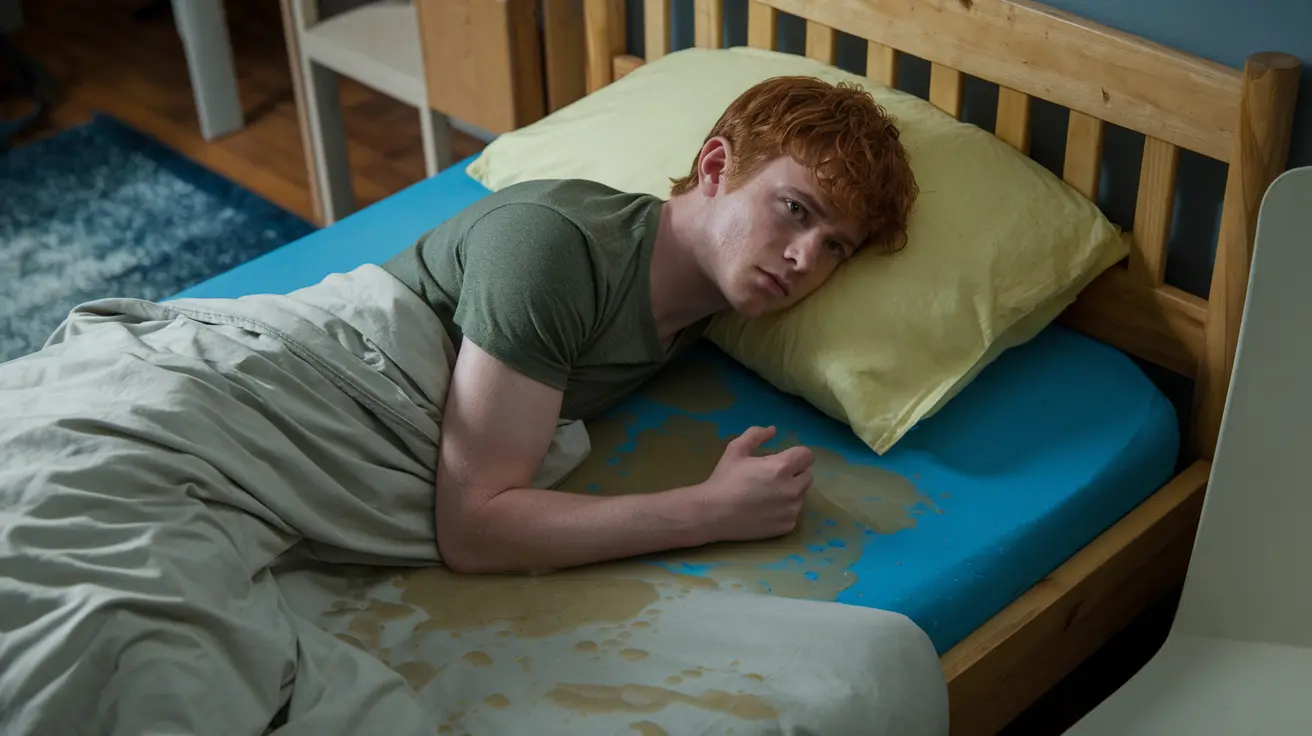Dreams About Bedwetting: Unveiling the Psychological Causes and Solutions
Discover the psychological causes and solutions behind dreams about bedwetting. Unveil the mysteries and find answers to your questions now!

“ Bedwetting dreams create vivid experiences that trigger a strong urge to urinate. “
Have you ever woken up from a bedwetting dream and thought, "What does that mean?" You are not alone. Many have dreams about bedwetting that feel too real. Sometimes, they wake up, and the dream comes true.
These dreams can connect to stress or other life events. They can also signal deeper problems, such as anxiety or unresolved childhood experiences. Don't let this worry you. Tons of people have these challenges, and then they figure it out.
You can too. There are ways to manage these dreams and real-life incidents. Knowing when to ask for help is everything. With support, you can find peace of mind and restful nights.
Let’s take a look at this issue positively and proactively.
Key Takeaways
- When you comprehend bedwetting dreams, you can discover their meaning. These dreams often tie into stress, anxiety, or unresolved issues from your past.
- There are many causes of adult bedwetting, ranging from lifestyle to emotional stress or medical reasons.
- Dreams about bedwetting may lead to embarrassment or anxiety in your daily life. If you can identify the emotional triggers behind such dreams, you can start to learn how to cope with them.
- To manage bedwetting problems, begin with a sleep diary. Then, manage your fluid intake and take care of your mental health issues.
- Preparing is critical for medical appointments. Take note of your symptoms, sleep habits, and emotional triggers to go over with your doctor.
- Yeah, you're not alone in that. Many have faced similar challenges and have successfully overcome them with the proper support and information.

Understanding Bedwetting Dreams
Bedwetting dreams create vivid experiences that trigger a strong urge to urinate. In some cases, spotting such dreams leads to instances of bedwetting. These dreams aren't just for kids; adults have them, too. It's not a conscious choice — your body's reacting on its own.
Now let's check out the real meaning of these dreams. We'll find out how they relate to your waking time.
What Are Bedwetting Dreams?
Picture this: You're in a dream, heading to a bathroom; everything feels normal. Here's the catch: you're wetting the bed. These dreams have a lot of urgency and involve toilets or bathrooms.
Like a rollercoaster, they can be intense. Sometimes, you feel a slight urge to pee, almost like a whisper. Other times, it is an intense urge, as though your body is wrestling with two competing demands: emptying your bladder versus getting enough sleep.
Connection to Real-Life Incidents
There's a reasonably strong relationship between these dreams and real bedwetting. You dream you have to pee and wake up to find you did. Dr. Brian Stork points out that 1 to 2 percent of adults suffer from nocturnal enuresis.
This term means involuntary urination that happens while asleep. It's not just a kid thing—many adults can't control their bladder at night. The brain misreads the signals while you drift off, triggering this physical response.
It's hard to determine whether the dream leads to bedwetting or vice versa, according to Dr. Chervin.
Feelings During These Dreams
Waking up from these dreams can leave you feeling embarrassed or puzzled. Anxiety and stress can compound this, even causing shame. You're not the only one; so many people go through this; it's part of the process.
Most bedwetting is simply a developmental delay, not an emotional problem or illness. Knowing that can help ease some of the emotional stress.
Causes of Bedwetting in Adults
Physical Causes of Adult Bedwetting
There are a whole bunch of physical reasons for bedwetting in adults. Take urinary tract infections (UTIs), for instance. They can cause you to feel like you need to go because of their constant sense of urgency. This can sometimes make it trickier to hold it.
Then there's stuff like prostate issues in men, which can interfere with the flow and control of urine. Additionally, you have to take bladder size into account. If you have a small bladder or an overactive one, it may push you to go even at night.
Don't be alarmed if you find yourself making midnight trips to the commode! Some medications, such as diuretics, flush out your system but can cause nighttime accidents.
Psychological Factors Behind Bedwetting
After all, bedwetting isn't just about physical things — the mind has its role as well. Stress and anxiety can trigger bedwetting dreams that turn real. You may assume this is a kid thing, but childhood fears can slip back into adulthood.
Emotional states can tug on the strings of your bladder and leave you with out-of-the-blue episodes. Sleep disorders, such as sleep apnea, disrupt your body's signals, making it hard to know when you have to go.
What is Enuresis?
Enuresis sounds fancy, but it simply means involuntary urination. It affects both kids and adults alike. You have primary enuresis, meaning that bedwetting has always been a part of your life.
In comparison, secondary enuresisEnuresis when bedwetting suddenly strikes after you've had years of dry nights. Many people think it's in the head; however, it's mostly related to internal factors such as hormones or bladder quirks.
Managing enuresisEnuresisnderstanding what's behind it and potentially using custom nightwear or therapy.
Types of Bedwetting
Here's a quick look at the types of bedwetting:
| Type | Characteristics | Causes |
|---|---|---|
| Primary | Continual bedwetting from childhood | Developmental delays |
| Secondary | Starts after being dry for a while | Stress or medical issues |
| Nocturnal | Happens during sleep | Often linked to deep sleep cycles |
| Diurnal | Occurs while awake | Often due to distractions or stress |
Each type has its characteristics, with different causes and approaches for how to fix it. Knowing the management approach can guide you in choosing which one to use.

Real-Life Impact of Dreams
Dreams about bedwetting can sneak into our lives and affect us in ways we don't expect, often manifesting as vivid dreams of a wet bed. These pee dreams can trick our minds, leaving us with feelings that last long after we wake up. Let's explain how these dreams can reach different parts of our lives.
Psychological and Emotional Effects
Having a dream where you wet the bed feels like a cruel joke. It's not just waking up to wet sheets; it's the emotional merry-go-round. Imagine your heart pounding, the embarrassment washing over you, even if it was a dream.
Such dreams can erode your self-esteem, causing you to second-guess yourself the next time you walk into a crowded room. You may stop sleeping over at friends' houses or sleeping in the same bed as a partner, worried about the dream happening again.
Impact on Sleep Quality
Now, let's talk about sleep. These dreams can hugely mess with your sleep. Perhaps you wake up in a panic only for it to be a dream. The damage is done — your sleep is interrupted, and you're tired and anxious the next day.
This cycle can result in significant fatigue, making it difficult to concentrate and enjoy the day.
Recurring Bedwetting and Self-Esteem
For some, these dreams aren't a one-shot deal. They just come back like an unwelcome guest. This can mess with your confidence. You might feel like you're the only one dealing with this, but here's the thing: you're not alone.
About 2% of people in the U.S. Experience this condition. Even fewer have such dreams that cause them to be triggered. Most grow out of it, but it can be isolating for those who don't.
Waking Up to a Surprise
Imagine dreaming that you went to the toilet, only to wake up and find your bed wet. Crazy shock, right? It's as if your body was tricked into believing everything was fine.
That confuses the mix-up. It can also disrupt your mental well-being and stir up unexpected emotions at the start of your day.
Open Discussions
Yes, it isn't easy to talk about these dreams. Sharing your experiences can make all the difference in the world. It feels good to know that other people struggle with these things.
It will decrease feelings of isolation. Encouraging open discussions can provide relief and support.
Understanding False Awakening
False awakening is this strange phenomenon where you dream you're awake but are not. Sometimes, your brain can play tricks on you. In that state, you may not even realize you must wake up and use the bathroom.
This can cause bedwetting accidents as well, further complicating matters.
Managing False Awakenings
To overcome this, it's important to be aware of when false awakenings occur. Keeping a sleep journal may help identify patterns.
Simple strategies such as going to bed at the same time every night or practicing relaxation techniques before bed can help. By understanding these dreams, you can better control them, which can help lower the risk of an accident.
Coping with Bedwetting Issues
1. Strategies to Manage Bedwetting
Managing bedwetting at home can feel overwhelming, but some practical strategies can help. First, start by limiting fluid intake in the late afternoon and evening. This doesn't mean dehydrating yourself—just be mindful not to overload drinks right before bed.
Having a bathroom routine can make a lot of difference. For example, make it a habit to go to the bathroom before falling asleep. Implementing an alarm can be a first call of action. This godsend gets you up during the night for a bathroom trip, thus minimizing the chances of an accident.
Keeping a diary is another good workaround. Track your habits for 2-3 weeks. This helps you identify patterns and track your progress, which makes it easier if you eventually choose to go to a doctor. Remember, it's all about small steps that add up over time.
2. Natural Remedies for Relief
If you're into trying natural remedies, there are a few you can try. Herbal teas, such as chamomile or valerian root, can relax the body and reduce bedwetting. Bladder training exercises can also be helpful. These include training your bladder to hold urine for longer periods during the day.
Lifestyle changes are equally important. Limiting caffeine and alcohol, particularly in the evening, can help with bedwetting. Even chewing on cinnamon sticks may help, as they are warming for the body, which can cut down on nighttime accidents.
3. Treatment Options Available
There are multiple types of treatments for the condition of bedwetting. Behavioral therapies focus on positive reinforcement and habit changes. Medications such as Desmopressin, typically given to adults, may also be crucial as they mimic the hormone that regulates urination.
Working with urologists or sleep specialists can lead to a personalized treatment plan that fits your unique needs. Dive into the traditional and the unconventional, and see what you can find. Do not be afraid to see what works for you!
4. When to Seek Professional Help
Bedwetting sometimes needs more than home remedies and lifestyle changes. If you notice signs like frequent bedwetting despite your self-help efforts, don't ignore them. If these symptoms impact your quality of life or mental health, speak to a healthcare professional immediately.
Treating underlying health problems is important since they can cause nocturnal enuresisEnuresiser that asking for help is a step toward improvement and wellness.

Preparing for Medical Consultation
Preparing for an appointment with your doctor regarding bedwetting requires a comprehensive approach. Here's a handy list to make sure you're well-prepared:
- Collect any relevant past medical records, especially family history regarding bedwetting, as they are often linked.
- Keep a diary of when it happens to a bedwetter. Is it every night or now and then? This helps the doctor see patterns.
- Do you see signs of UTIs or other symptoms? Write them down.
- Share your child's feelings and experiences. That's where honesty can help in tailoring the best treatment plan.
Being honest with your healthcare provider can help alleviate most of the stress and stigma associated with nocturnal enuresisEnuresispenness can also lead to effective treatments like behavioral therapy or medication.
What to Expect at the Doctor's Office
When you walk into the doctor's office, realize that you are not the only one — millions of kids feel this. The consultation typically starts with a thorough discussion of the symptoms and history.
The doctor may perform a physical examination and ask questions to rule out any underlying conditions. Look out for conversations about lifestyle changes, such as bladder retraining or changing fluid intake (particularly if your child has sports in the evening).
They might recommend urine tests to look for infections. It's essential to establish a comfortable rapport with the doctor. That makes it easier to talk openly, which is necessary for effective communication and finding the right solution.
Questions to Ask Your Doctor
Before leaving the doctor's office, ask these critical questions:
- What causes bedwetting in my child's case?
- What treatment options are available?
- Lifestyle changes can help, such as setting bathroom times or wearing absorbent underwear.
- What should we expect timeline-wise for dry nights?
- How can we address the emotional impact of bedwetting?
The better you can proactively think about these questions, the better you will be able to manage bedwetting. Remember that if one treatment doesn't work, it's fine to go back and try another. Be patient—up to 16 weeks before you will see dry nights.
Conclusion
I know diving into dreams about bedwetting seems strange, but it's very telling. They whisper secrets about stress, hidden worries, or even too much pizza before bed. These dreams can shake up your day; however, you aren't alone. A lot of people are baffled by these nocturnal incidents. Here's the thing: take a step back, look at your lifestyle, and maybe chat with a doctor if it keeps bugging you. Everyone deserves peace in dreamland.
You ready to get into it? Start by writing down what's on your mind before going to bed. Perhaps change your bedtime routine. Don't be afraid to ask for help if you do. We're all together; tackling it head-on can bring nighttime peace. Keep dreaming and exploring—and, of course, remember there's a solution to every problem.

Frequently Asked Questions
Recent Dreams
Other Dreams
Read more dream interpretations
Dive into the realm of dreams. Explore various dream interpretations. Enhance your understanding of what your dreams could be telling you.
About the author
We provide insights to harness the power of your dreams, improving not just your nighttime narrative, but your daily life as well.














